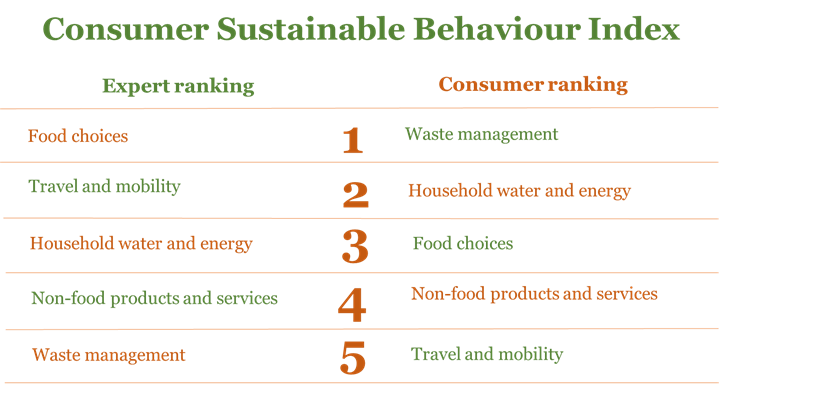This website uses cookies so that we can provide you with the best user experience possible. Cookie information is stored in your browser and performs functions such as recognising you when you return to our website and helping our team to understand which sections of the website you find most interesting and useful.
Consumers and experts disagree on sustainability priorities

Consumer priorities for sustainable choices don’t match expert opinion. We must rethink communication and behaviour change strategies so decisions have maximum impact.
Consumers are already sharing the responsibility for transitioning to a clean, sustainable and circular economy. They have adopted new habits, and the vast majority (90%) want to buy products with a low environmental impact (2020 European Commission study).
However, a much deeper shift in everyday behaviours is urgently required to develop fully sustainable systems that balance social, economic and environmental goals.
The sheer amount of sustainability options can make it difficult for consumers to decide where to focus effort. They might listen to expert advice, choose the cheapest thing to change or follow what their friends and family do. They might simply continue with long term habits, following ingrained or outdated advice.
Understanding consumer assumptions about sustainable choices
Policy makers need to understand the way consumers prioritise decisions about sustainability so they can build evidence-based behaviour change strategies. Key to this is appreciating there may be differences between consumer assumptions about the most effective sustainability changes and the opinions of sustainability experts.
Where there are differences, behaviour change and communication strategies can adapt to close the gap. This will mean consumers’ commitments to sustainable behaviour change are directed at the right targets and not wasted.
Do consumer choices match expert opinion?
A new multi-partner research project from Euroconsumers, ICRT and BEUC explored the difference between consumer and sustainability expert priorities for behaviour change. The aim was to establish where and why there might be significant gaps in expert and consumer opinion and what course of action could overcome this.
It established a consensus of expert opinion on the consumer behaviour changes most likely to impact sustainability and cross-checked these with what consumers themselves thought and did.
Consumer Sustainable Behaviour Index
To begin, the project developed a Consumer Sustainable Behaviour Index (CSBI) based on five main consumer activities that impact sustainability: food, travel and mobility, water and energy in the household, non-food products and services, and waste management.

Expert view
A total of 39 sustainability experts and academics assessed the dimensions. The experts came from different backgrounds and countries: consumer and sustainability movement, academia, public sector, think tanks etc, and included colleagues from Euroconsumers working in the sustainability field.
Within each of the categories, a further list of five behaviours were ranked according to the level of impact they had on sustainability. Within food, for example, it might be adopting a plant-based diet or buying local produce. Behaviours around waste might include recycling or repairing products or minimising any new purchases.
Consumer survey
Using the same categories of the Consumer Sustainable Behaviour Index, around 14,000 consumers across 14 countries were surveyed. We will focus on consumers surveyed in Euroconsumers member countries Spain, Italy, Belgium and Portugal. They were asked to rank the importance of the five main categories in terms of impact on sustainability, and then rank the importance of different types of behaviours within each category.
Consumer and expert priorities compared
- The two groups agreed that the purchase of non-food products and services had a low impact in terms of sustainability. Both ranked this fourth on the list of five. But after that, the opinion of consumers in Spain, Italy, Belgium, Portugal diverged from expert assessments.
- The experts ranked behaviour change in the overall category of “food” as the most impactful. Travel and mobility came next with walking and using public transport highest on the list of impactful behaviours. Consumer changes in “waste management” and “purchase of non-food products and services”, were seen as least important by the expert group.
- Consumers in Belgium, Portugal, Italy and Spain ranked waste management and water and energy use in the home highest, and felt food was less of a priority. A big gap in the rankings was in travel and mobility. Experts put this at number two for impact while consumers ranked it as having the least impact.
Travel and mobility behaviours in depth
Looking at the behaviours within the broad categories revealed more insights. Within travel and mobility, “not having a car” was considered less important by consumers than it was by experts.
Consumers felt it was more important to only use a car when necessary and to choose a low emission car instead of renouncing a car altogether. There was agreement on flying though as both ranked cutting out flying had a high sustainability impact.
Food choices in depth
Looking at choices around food, the experts ranked “following a plant-based diet” as the most important but it was the least important for consumers. This suggests that our surveyed consumers are not fully aware of the impact of mass consumption of animal products on sustainability or at least, they do not consider this as a priority. Instead, they ranked reducing food waste as most important.
Waste management behaviours in depth
Looking at this category, consumers consider “recycling properly” as the most important behaviour, whereas for experts it is the least. This could suggest that long term messages about recycling properly have more of an ongoing impact than the concept of not producing waste which was ranked highest by experts.
As well as measuring consumers’ opinions of perceived importance of different activities, the survey also asked where they were performing best in practice. Consumers perceive themselves to be making important efforts to ensure their behaviour is sustainable, and feel they perform the best in “waste management” and “purchase of products and services”. Interestingly, both of these categories were given the least weight by experts.
“The continued focus on recycling suggests that consumers are sticking with long term messages. This is still an essential part of sustainability but we now need much more awareness about managing waste throughout the system and not just when we sort our waste. More research is needed to help develop the most effective communications and change strategies”
Els Bruggeman, Head of Policy and Enforcement, Euroconsumers
What do the results tell us?
The research shows a misalignment between the experts’ vision on how to live most sustainably and consumer’s perspectives. This suggests advocacy and education is needed in both directions. Consumers may well be following ingrained habits or basing decisions on outdated information.
However, it is clear they are making efforts and feel that they are contributing to sustainability. There is a major opportunity to offer public advice on the best levers to pull to have an impact on sustainability.
In the other direction, it’s clear that experts and policy makers should work much more closely with consumers to understand their perspective and to create different behaviour change programmes from their starting point. They must acknowledge and build on the existing and ongoing efforts that people make every day.
Price still holds back consumer behaviour change
Participants were also asked what was holding them back from making more sustainable choices. Here, respondents in Italy, Spain, Portugal and Belgium consistently mentioned that the number one obstacle to living more sustainably is the fact that it is too expensive.
Consumers continue to feel that living sustainably is expensive. Whether or not this is the case, while it remains the perception people are unlikely to engage in sustainability decisions. It’s really important to communicate the overall lifetime costs of choices as well as the initial upfront costs and to support and encourage investment in sustainable purchases.
An affordable and just transition
Urgent interventions are needed to ensure that all consumers are able to be part of a just and equitable sustainability transition and make adaptations that don’t leave them out of pocket.
Policy makers must ensure any transition is affordable and takes account of social and economic disparities, so that those who can afford the least do not face a disproportionate financial burden for the sustainability transition.
Sustainability is about guaranteeing the balance between environmental, social, and economic aspects. It is much more than just environmental action. Communications and awareness raising must address this and provide firm and unambiguous messaging on where consumers’ efforts should be invested. Closing the gap between old habits and effective behaviours will make sure we can build a future that is ‘Approved by Tomorrow’.


